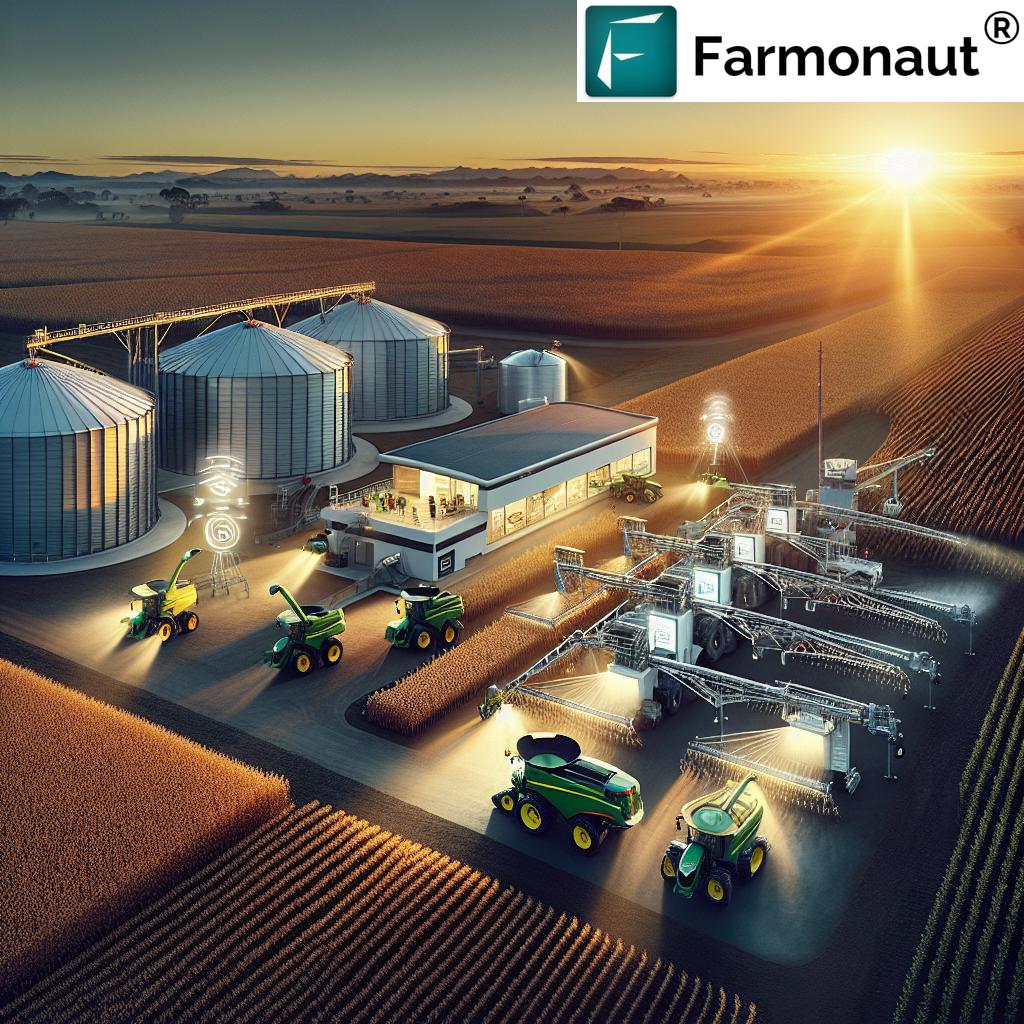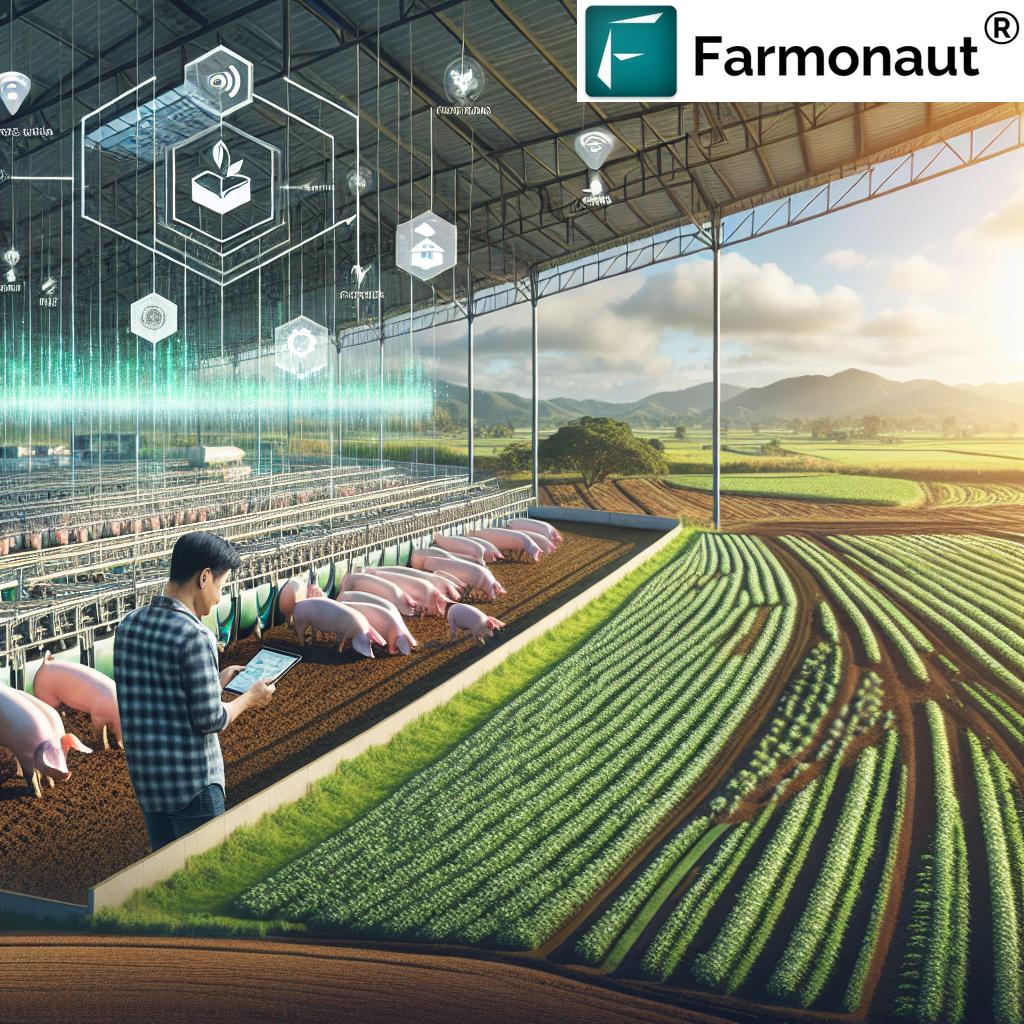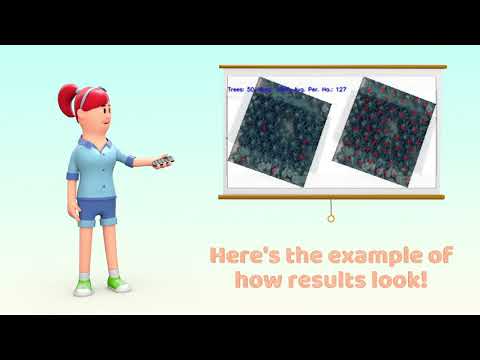Revolutionizing Sustainable Farming: How Farmonaut’s Precision Agriculture Systems Transform Brazilian Protein Production

“Farmonaut’s precision agriculture systems can increase protein production efficiency by up to 30% in Brazilian farms.”
In the heart of Brazil’s vast agricultural landscapes, a revolution is taking place. We’re witnessing the transformation of traditional farming practices into highly efficient, sustainable protein production systems. At the forefront of this agricultural renaissance is Farmonaut, a pioneering company leveraging cutting-edge technology to reshape the future of farming. In this comprehensive exploration, we’ll delve into how Farmonaut’s precision agriculture systems are revolutionizing sustainable farming practices and transforming Brazilian protein production.
The Brazilian Protein Production Landscape
Brazil, known for its expansive agricultural sector, plays a crucial role in global protein production. From poultry to pork, the country’s farming industry has long been a significant contributor to the world’s food supply. However, with growing global demand and increasing environmental concerns, the need for more efficient and sustainable farming practices has never been more pressing.
This is where Farmonaut steps in, offering innovative agricultural technology solutions that address these challenges head-on. By integrating advanced satellite imagery, artificial intelligence, and data analytics, Farmonaut is paving the way for a new era of precision agriculture in Brazil’s protein production sector.
Farmonaut’s Precision Agriculture Systems: A Game-Changer for Protein Production
Farmonaut’s approach to precision agriculture is revolutionizing how Brazilian farmers manage their livestock and crops. Let’s explore the key components of their system and how they’re transforming protein production:
- Satellite-Based Crop Health Monitoring: Utilizing multispectral satellite imagery, Farmonaut provides real-time insights into vegetation health, soil moisture levels, and other critical metrics. This data is invaluable for optimizing feed production for livestock.
- Jeevn AI Advisory System: This AI-driven tool delivers personalized farm advice, weather forecasts, and expert crop management strategies. For protein producers, this means more efficient feed management and improved livestock care.
- Blockchain-Based Product Traceability: Ensuring transparency from farm to table, this feature is particularly crucial for Brazil’s meat export industry, enhancing trust and reducing fraud in the supply chain.
- Fleet and Resource Management: Optimizing logistics and machinery usage, this tool helps reduce operational costs in large-scale protein production facilities.
- Carbon Footprinting: By tracking emissions in real-time, Farmonaut enables protein producers to take concrete steps towards sustainability and environmental compliance.
Transforming Efficient Poultry Operations
In the realm of poultry production, Farmonaut’s precision agriculture systems are making significant strides. By integrating smart sensors and IoT devices with their satellite-based monitoring, farmers can now:
- Monitor and control temperature and humidity levels in poultry houses with unprecedented accuracy
- Optimize feed distribution based on real-time data on flock health and growth rates
- Implement early disease detection systems, reducing the need for antibiotics and improving overall flock health
- Manage water consumption more efficiently, reducing waste and ensuring optimal hydration for the birds
These advancements not only improve the welfare of the poultry but also significantly increase productivity and reduce operational costs.
Advancing Swine Production with Precision Technology
The swine industry in Brazil is also benefiting immensely from Farmonaut’s innovations. Advanced swine production equipment, when integrated with Farmonaut’s precision agriculture systems, offers:
- Automated feeding systems that adjust nutrient content based on individual pig growth patterns
- Smart ventilation units that maintain optimal air quality and temperature, reducing stress on the animals
- Waste management solutions that minimize environmental impact while maximizing resource recovery
- Health monitoring systems that can detect early signs of illness, allowing for prompt intervention
“Advanced swine production equipment can reduce water usage by 25% while improving growth rates by 15%.”
These technological advancements are not just improving efficiency; they’re also addressing key sustainability concerns in the swine industry.
Explore Farmonaut’s API for custom integration
Smart Irrigation Solutions: Optimizing Water Usage in Feed Production
Water management is crucial in both livestock care and feed production. Farmonaut’s smart irrigation solutions are transforming how Brazilian farmers approach water usage:
- Satellite-based soil moisture monitoring allows for precise irrigation scheduling
- AI-powered predictive models help farmers anticipate water needs based on crop type, growth stage, and weather forecasts
- Automated irrigation systems can be controlled remotely, reducing labor costs and improving efficiency
- Water usage tracking helps identify leaks and inefficiencies, promoting conservation
By optimizing water usage in feed production, Farmonaut is helping to reduce the overall water footprint of protein production in Brazil.
Agricultural GIS Applications: Mapping the Future of Protein Production
Geographic Information Systems (GIS) play a crucial role in Farmonaut’s approach to precision agriculture. In the context of Brazilian protein production, GIS applications offer:
- Detailed mapping of farm layouts for optimal resource allocation
- Analysis of land suitability for different types of livestock or feed crops
- Tracking of animal movements and behavior patterns for improved management
- Identification of potential environmental risks and mitigation strategies
These GIS applications provide farmers with a comprehensive view of their operations, enabling data-driven decision-making at every level.
Grain Storage Innovations: Ensuring Quality Feed for Livestock
Efficient grain storage is essential for maintaining a steady supply of high-quality feed for livestock. Farmonaut’s technology contributes to grain storage innovations by:
- Monitoring temperature and humidity levels in storage facilities to prevent spoilage
- Implementing blockchain-based tracking systems to ensure traceability of grain from field to feed
- Optimizing inventory management to reduce waste and ensure consistent supply
- Providing real-time alerts for potential issues, allowing for quick intervention
These innovations not only improve the quality of feed but also contribute to the overall efficiency and sustainability of protein production systems.
Access Farmonaut’s API Developer Docs for integration guidance
Livestock Management Technology: A New Era of Animal Care
Farmonaut’s precision agriculture systems are ushering in a new era of livestock management technology. By leveraging data from various sources, farmers can now:
- Monitor individual animal health and performance in real-time
- Implement predictive maintenance on farming equipment to prevent breakdowns
- Optimize breeding programs based on genetic data and performance metrics
- Automate routine tasks, allowing farm workers to focus on higher-value activities
This technology-driven approach not only improves animal welfare but also significantly enhances the efficiency and profitability of protein production operations.

Sustainable Farming Practices: The Core of Farmonaut’s Mission
At the heart of Farmonaut’s innovations is a commitment to sustainable farming practices. By implementing precision agriculture systems, Brazilian protein producers can:
- Reduce water usage through optimized irrigation and efficient livestock watering systems
- Minimize chemical inputs by targeting applications based on precise soil and crop data
- Lower energy consumption through smart equipment management and renewable energy integration
- Decrease greenhouse gas emissions by improving overall farm efficiency and implementing carbon tracking
These sustainable practices not only benefit the environment but also contribute to the long-term viability and profitability of protein production in Brazil.
Agricultural Equipment Solutions: Integrating Technology for Maximum Efficiency
Farmonaut’s systems are designed to integrate seamlessly with a wide range of agricultural equipment solutions, including:
- Advanced feeders and watering systems that adjust based on real-time data
- Smart ventilation units that respond to environmental conditions and animal behavior
- Automated cleaning and waste management systems that improve hygiene and resource recovery
- Precision planting and harvesting equipment for optimal feed crop production
This integration ensures that every aspect of the protein production process is optimized for efficiency and sustainability.
The Impact on Brazilian Agriculture and Global Food Security
The implementation of Farmonaut’s precision agriculture systems in Brazilian protein production is having far-reaching effects:
- Increased productivity and efficiency in livestock operations
- Enhanced food quality and safety through improved traceability and management practices
- Reduced environmental impact, contributing to Brazil’s sustainability goals
- Improved competitiveness in the global protein market
- Greater resilience to climate change and market fluctuations
These advancements are not only transforming Brazilian agriculture but also contributing significantly to global food security by ensuring a stable and sustainable supply of protein.
Comparative Analysis: Traditional vs. Farmonaut’s Precision Agriculture Systems
| Aspect | Traditional Methods | Farmonaut’s Precision Agriculture |
|---|---|---|
| Irrigation Efficiency | Manual scheduling, often leading to over or under-watering | AI-driven, satellite-based scheduling for optimal water use |
| Feed Management | Generalized feeding schedules for entire herds/flocks | Individualized feed optimization based on real-time data |
| Livestock Monitoring | Periodic manual checks | Continuous automated monitoring with AI-driven insights |
| Environmental Impact | Limited ability to track and manage emissions | Real-time carbon footprinting and sustainability metrics |
| Yield Optimization | Based on historical data and experience | Data-driven predictions and real-time adjustments |
| Resource Utilization | Often inefficient due to lack of precise data | Highly optimized through AI and satellite data analysis |
| Data-Driven Decision Making | Limited, often relying on intuition | Comprehensive, based on real-time and historical data |
| Equipment Integration | Standalone systems with manual coordination | Fully integrated, IoT-enabled smart farming ecosystem |
| Maintenance Requirements | Reactive, addressing issues as they arise | Predictive maintenance, preventing breakdowns |
| Overall Productivity | Variable, subject to many uncontrolled factors | Consistently higher, with reduced variability |
The Future of Protein Production: Farmonaut’s Vision
As we look to the future, Farmonaut’s role in shaping sustainable and efficient protein production systems becomes increasingly crucial. The company’s ongoing research and development efforts focus on:
- Advancing AI capabilities for even more precise farm management
- Expanding the use of blockchain technology for enhanced traceability
- Developing new sensors and IoT devices for more comprehensive data collection
- Exploring the potential of vertical farming and other innovative production methods
These efforts promise to further revolutionize protein production, making it more sustainable, efficient, and capable of meeting the growing global demand for high-quality protein.
Conclusion: Embracing the Precision Agriculture Revolution
The transformation of Brazilian protein production through Farmonaut’s precision agriculture systems represents a significant leap forward in sustainable farming practices. By leveraging cutting-edge technology, from satellite imagery to AI-driven analytics, Farmonaut is empowering farmers to produce more with less, while simultaneously reducing their environmental impact.
As global demand for protein continues to rise, the innovations pioneered by Farmonaut in Brazil serve as a model for sustainable intensification of agriculture worldwide. The future of farming is here, and it’s precise, data-driven, and sustainable.
For farmers, agribusinesses, and policymakers looking to embrace this agricultural revolution, Farmonaut offers a comprehensive suite of tools and services. From their user-friendly mobile apps to their powerful API for custom integrations, Farmonaut is making precision agriculture accessible and impactful for operations of all sizes.
Farmonaut Subscriptions
Frequently Asked Questions
- How does Farmonaut’s technology improve protein production efficiency?
Farmonaut’s precision agriculture systems use satellite imagery, AI, and real-time data analytics to optimize every aspect of farm management, from irrigation to livestock care, resulting in increased productivity and resource efficiency. - Can small-scale farmers benefit from Farmonaut’s solutions?
Yes, Farmonaut offers scalable solutions suitable for farms of all sizes, making precision agriculture accessible and affordable for small-scale farmers. - How does Farmonaut contribute to sustainable farming practices?
By optimizing resource use, reducing waste, and providing tools for carbon footprint tracking, Farmonaut helps farmers implement more sustainable and environmentally friendly practices. - Is Farmonaut’s technology compatible with existing farm equipment?
Farmonaut’s systems are designed to integrate with a wide range of agricultural equipment, enhancing the functionality of existing farm infrastructure. - How does blockchain technology improve protein production?
Blockchain ensures traceability throughout the supply chain, enhancing food safety, reducing fraud, and building consumer trust in protein products.
As we conclude this exploration of Farmonaut’s revolutionary impact on Brazilian protein production, it’s clear that precision agriculture is not just the future of farming – it’s the present. By embracing these innovative technologies and sustainable practices, we can ensure a more efficient, productive, and environmentally responsible agricultural sector, capable of meeting the world’s growing demand for protein in a sustainable manner.






